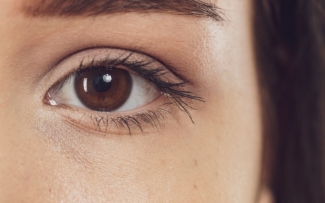Brown Eyes
There are a few kinds of brown eyes — light, dark, and everything in between — and each shade has a striking appearance. Though the eye colour is common in people around the globe, brown eyes are unique to each individual who has them. Read on to learn what makes brown eyes special, what causes a person to have them, and what benefits they can provide.
How rare is the brown eye colour?
Brown eyes are the most common of all eye colours. An estimated 70% to 80% of people around the world have brown eyes. These shades range from light brown eyes to dark and hazel brown eyes.
What causes brown eyes?
The most important factors that come into play when determining brown eye colour are melanin and genetics.
Melanin
Melanin is a pigment found in the body that determines the colour of your hair, skin, and eyes. The more melanin a person has, the darker their hair, skin, and eyes. So, if you have a large amount of melanin in your iris (coloured part of your eye), your eyes will be a dark shade, like brown.
Genetics
Another major component of eye colour is your genetics. This used to seem like a rather simple concept: Children inherit your eye colour from their parents. Brown was considered a dominant trait and blue recessive. But experts have since discovered that there are actually dozens of genes and genetic mutations that help determine your eye colour.
So, can two parents with brown eyes produce a child with blue eyes? Or vice versa? Yes, it’s possible, though it may not be very common. Sometimes eye colour skips a generation as well.
Baby eye colour can change to brown
Sometimes, babies are born with light-coloured eyes, but their shade gradually darkens to brown or another hue over time. This is due to the amount of melanin that is present at birth, and how much develops as the baby grows.
Additional melanin development can result in a baby having darker eyes, skin, and hair than they did at birth. The total amount of melanin a baby ends up developing depends on the genes they inherit from their parents.
A baby’s eyes can start to change colour in their first few months, but subtle changes can continue up until age 3. Not all babies’ eyes will change colour.
Side effects and benefits of brown eyes
Having brown-coloured eyes can have positive and negative effects on your eye health, appearance and other aspects of your life.
Side effects
Less aesthetically pleasing
According to many surveys, people generally prefer the look of lighter eyes — like blue, green, or grey — over brown ones. This is all subjective, so don’t get discouraged if you’re a brown-eyed person. But if you ever want to try out a different eye colour, you should talk to your optician about coloured contact lenses.
Higher risk for cataracts
According to research, having dark brown eyes may increase your chances of developing cataracts. (The risk is lower for lighter coloured eyes.) Since exposure to ultraviolet (UV) light can also contribute to cataract development, you should wear appropriate UV protective eyewear any time you go outside.
Benefits
Less light sensitivity
Compared to those with blue eyes, people with brown eyes aren’t as sensitive to fluorescent light or natural sunlight. Brown-coloured eyes have more pigmentation, which means they can block out more of the harsh effects of indoor and outdoor lighting.
This doesn’t mean you can forgo UV protection if you have brown-coloured eyes. Ultraviolet radiation from the sun is harmful to everyone, regardless of eye colour. You should always wear sunglasses with 100% UVA-UVB lens protection when you go outside — even if the skies are cloudy.
Lower risk for certain eye conditions
Having more melanin may provide a defence against specific eye conditions. People who have lighter eyes are more likely than people with brown or dark-coloured eyes to develop age-related macular degeneration (AMD) or diabetic retinopathy.
Celebrities with brown eyes
Many well-known actors, musicians, and socialites have light brown eyes, hazel brown eyes, and darker shades of the eye colour. Some of our favourite brown-eyed celebrities include:
- Orlando Bloom
- Keira Knightley
- Idris Elba
- Rowan Atkinson
- Matt Berry
- Cynthia Erivo
- Helena Bonham Carter
- Ellie Goulding
- Daniel Kaluuya
- Tom Holland
- Emma Watson
- Colin Farrell
- Kit Harrington
- Letitia Wright
Caring for your brown eyes
Regardless of your eye colour, it’s critical to take care of your eyes. Your optician will check your vision and eye health during your annual eye test. However, if you notice any changes to your eyes or vision before it’s time for your next exam, don’t hesitate to book an earlier appointment.
Existing Lenstore customers can get a free eye test with our trusted partner, Vision Express — simply book an appointment online.
Sources
- The world's population by eye color. WorldAtlas. January 2023.
- Melanin. Cleveland Clinic. March 2022.
- Eye colors. Cleveland Clinic. March 2024.
- Will my baby's eye color change? Vision Center. August 2024.
- What is the most attractive eye color? Readers.com. Accessed October 2024.
- 8 things you might not know about cataracts. EyeSmart. American Academy of Ophthalmology. May 2020.
- Myth or fact: Blue eyes are more sensitive to light. Duke Health. July 2021.
- What your eye color can say about your health. AARP. August 2023.


